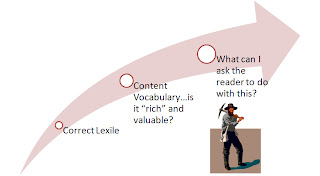Too many teachers dont' know the secret formula for "rich text" and we as librarians can help out here.
Lexile measure is only a small piece (although vital) to the equation. The other components are: How valuable is this? Will the kids get excited? Does this passage embrace rigor where the students will have to read closely to understand and grasp difficult concepts? AND -- What am I going to ask the students to do with this passage?
Our knowledge of database searching will prove valuable in finding great articles. Some lexiles are front and center in a search, while others require the use of advanced search features to find Lexiles.
When evaluating the "richness" of a piece it helps to have a rubric. Here is one I've developed, and two other links to NYC's rubrics. If you wrap your head around this, you'll be in good shape.
- Rich Text Rubric based upon PARCC and NAEP comments
- NYC's Narrative Rubric
- NYC's Non-Fiction Rubric
See my previous blog posts for additional information on this topic:
- http://librarydoor.blogspot.com/2011/12/fishing-for-lexiles.html
- http://librarydoor.blogspot.com/2011/09/common-core-complex-text-become-go-to.html
- http://librarydoor.blogspot.com/2011/12/whistleblowers-and-winterwonderlands.html
- http://librarydoor.blogspot.com/2011/08/rttt-ccss-library-classroom-resources.html


No comments:
Post a Comment